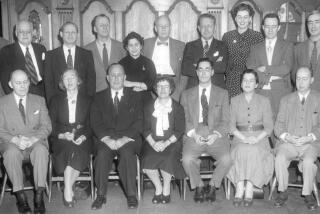Changing Climate Among Superpowers May Aid the Fight Against Drugs
- Share via
A hopeful event in the long struggle against international narcotics traffic is the decline in Cold War tensions. Why this is so can be seen from the curious history of attempts at narcotics control.
Fighting narcotics has never been the highest priority in international relations, even for the United States. International narcotics policy floats on a sea of great- power relationships and goals. In the last 40 years the most persistent obstacle to controlling the supply of opium has been the Cold War, which divided the world into suspicious and hostile camps. Opium production flourished as the growers played off one power against another or were themselves used in the pursuit of the higher priority of national scrutiny.
Eighty years ago the United States started the world anti-narcotic movement by calling for, then chairing, the Shanghai Opium Commission. The commission was made possible by an unusual coincidence of anti-narcotic sentiment in Britain, China and the United States. A slightly different mixture of events and timing and there would have been no meeting. Building on the commission’s expression of concern, the United States next called for and chaired the Hague Opium Conference. There, the first treaty intended to control narcotics was completed in 1912. America fulfilled its Hague Treaty obligations by passing the Harrison Act.
Few governments, even among those who attended these pioneer meetings, shared America’s firm conviction that any non-medical use of narcotics was wrong and should be strictly prohibited everywhere.
Little progress was made during World War I to add to the nations ratifying the treaty. After the war ended, several nations, including the United States, conceived the ingenious idea of putting the Hague Treaty into the Versailles Treaty. As a result, ratification of the Versailles Treaty required a nation to enact domestic narcotic controls within 12 months. It was this requirement, rather than any heroin or opium problem, that was responsible for the British Dangerous Drugs Act of 1920, so often touted as having “solved” a drug problem by providing heroin by prescription.
In spite of widespread ratification of the Hague Treaty and the assumption of a narcotics-control oversight role by the League of Nations, consensus remained elusive. First, the United States refused to join the league. Then, in 1925, the American delegation walked out of the Geneva Opium Conference convinced that other nations did not sincerely wish to end the traffic in narcotics. When the United States finally resumed cooperating in the 1930s, war in China and then the outbreak of World War II intervened.
Within the first 40 years of attempting to control narcotics, therefore, the convergence of circumstances that made possible the beginning of the international movement never reached the success anticipated. Although treaties were written, bureaucracies established and many meetings held, the comprehensive control of narcotics was never achieved. Narcotics use fell in the United States between the two world wars chiefly due to reduction in demand.
Recognizing that the vicissitudes of international relations are the key to an effective control of narcotics, the prospect of lowered tensions between the United States, the Soviet Union and China is the most optimistic combination of events since the Shanghai gathering in 1909.
These three great powers--bitterest enemies for long stretches since World War II--are among the most intolerant of drug use. Joint efforts in this area could devastate the opium growers along the southern rim of the Soviet Union and China as well as persuade each nation that it would obtain great domestic benefits through cooperative action. Whether this will happen depends, as usual, on the course of larger events.
The Chinese government’s suppression of the student democracy movement is an example of how unexpected events could derail cooperation. On the other hand, Cuba’s crackdown on cocaine smuggling as the Soviets begin to withdraw financial support of the Fidel Castro regime is an example of how alteration of traditional Cold War relationships can surprisingly improve the prospects for drug control.
As the originators of the international anti-narcotic movement, we ought to be the nation most aware of how difficult the attainment of that goal is. Recognizing the difficulty of controlling narcotic supply in the absence of great-power cooperation, we should be modest in our expectations for interdiction.
Our drug problem may once again be curbed by the gradual reduction in demand, not by relying on the extinction of supply. Indeed, the recent National Household Survey of Drug Abuse confirms other signs that middle-class drug use is declining.
Still, it is tempting to speculate on what would happen to narcotic supplies if Cold War tensions continue to subside. Then the time will come for a second meeting at Shanghai.
More to Read
Sign up for Essential California
The most important California stories and recommendations in your inbox every morning.
You may occasionally receive promotional content from the Los Angeles Times.












